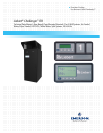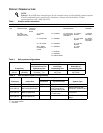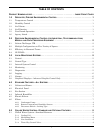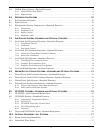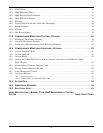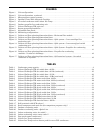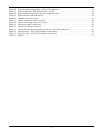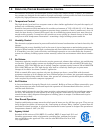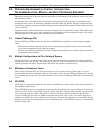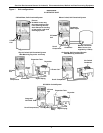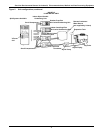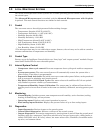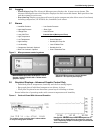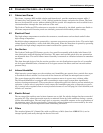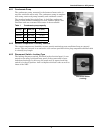
Dedicated, Precise Environmental Control
1
1.0 DEDICATED, PRECISE ENVIRONMENTAL CONTROL
For sensitive electronics, environmental control is more than simple cooling. “Comfort” air condition-
ing systems are designed for the comfort of people and simply cannot provide the kind of environment
required by high performance computer or communication equipment.
1.1 Temperature Control
The high density heat load in a computer room or other similar application is beyond the capacity of
ordinary air conditioning systems.
Sensitive electronics are best maintained in a stable environment of 72°F ±2°F (22.2°C ±1°C). Because
computers and communications equipment generate large quantities of heat in small areas, six to 10
times the heat density of normal office space, the air conditioning system must have more than just
enough cooling capacity. It must have the precision to react quickly to a drastic change in heat load
and prevent wide temperature fluctuations—something a large building system cannot do.
1.2 Humidity Control
The electronic equipment must be protected from both internal condensation and static electricity dis-
charges.
Maintaining the correct humidity level in the room is just as important as maintaining proper tem-
perature. When humidity is too high, condensation may form inside electronic equipment and damage
it. If humidity is too low, static electricity could disrupt operation or even shut down the electronic
system. An ordinary building system cannot normally control the environment within these boundar-
ies.
1.3 Air Volume
Computers and other sensitive electronics require greater air volumes than ordinary air conditioning
can provide. Typical comfort systems are designed to provide between 300 and 400 CFM (cubic feet
per minute), (500–700 CMH) per ton of cooling. Computer systems require between 500 and 600 CFM
(850–1020 CMH) per ton. The high density heat load in a relatively small space requires more
changes of air than a less dense “comfort” application.
While a normal office space requires only two air changes per hour, a room filled with electronic
equipment requires up to 30 changes per hour. Without proper air volume, hot spots and temperature
fluctuations could develop within the room. Also, greater air volumes provide the higher sensible heat
ratios required by electronic computer equipment.
1.4 Air Filtration
A clean environment of properly filtered air is essential. Build-up of dust and fibers attracted by oper-
ating electronics can cause faults and impair the operation of electromechanical devices, such as
switches and disk drives.
In short, today’s electronics need the same precision environmental control that mainframe comput-
ers need. The difference is that instead of one large computer room there are several small, often
crowded rooms, widely dispersed throughout a building, plant or campus. Conditions and require-
ments can vary widely.
1.5 Year Round Operation
Comfort conditioning systems cannot be relied upon 24 hours per day 365 days per year. They are typ-
ically designed to operate 10 hours per day, from spring to autumn. Many “comfort” systems have no
provision for winter operation. A precision environmental control system is designed for operation at
temperatures down to -30°F (-34.4°C).
1.6 Agency Listed
Standard 60 Hz units are CSA (NRTL-C) certified. NRTL-C meets both U.S. and
Canadian government safety requirements, providing fast, problem-free inspec-
tion and building code approvals. The units are also MEA listed for New York
City applications.



